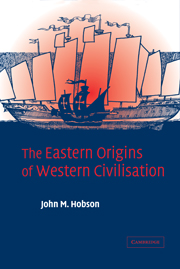Book contents
- Frontmatter
- Contents
- List of tables
- Preface and acknowledgements
- Map: Hobo-Dyer projection of the world
- 1 Countering the Eurocentric myth of the pristine West: discovering the oriental West
- I The East as an early developer: the East discovers and leads the world through oriental globalisation, 500–1800
- 2 Islamic and African pioneers: building the Bridge of the World and the global economy in the Afro-Asian age of discovery, 500–1500
- 3 Chinese pioneers: the first industrial miracle and the myth of Chinese isolationism, c. 1000–1800
- 4 The East remains dominant: the twin myths of oriental despotism and isolationism in India, South-east Asia and Japan, 1400–1800
- II The West was last: oriental globalisation and the invention of Christendom, 500–1498
- III The West as a late developer and the advantages of backwardness: oriental globalisation and the reconstruction of Western Europe as the advanced West, 1492–1850
- IV Conclusion: the oriental West versus the Eurocentric myth of the West
- Notes
- Index
4 - The East remains dominant: the twin myths of oriental despotism and isolationism in India, South-east Asia and Japan, 1400–1800
Published online by Cambridge University Press: 22 September 2009
- Frontmatter
- Contents
- List of tables
- Preface and acknowledgements
- Map: Hobo-Dyer projection of the world
- 1 Countering the Eurocentric myth of the pristine West: discovering the oriental West
- I The East as an early developer: the East discovers and leads the world through oriental globalisation, 500–1800
- 2 Islamic and African pioneers: building the Bridge of the World and the global economy in the Afro-Asian age of discovery, 500–1500
- 3 Chinese pioneers: the first industrial miracle and the myth of Chinese isolationism, c. 1000–1800
- 4 The East remains dominant: the twin myths of oriental despotism and isolationism in India, South-east Asia and Japan, 1400–1800
- II The West was last: oriental globalisation and the invention of Christendom, 500–1498
- III The West as a late developer and the advantages of backwardness: oriental globalisation and the reconstruction of Western Europe as the advanced West, 1492–1850
- IV Conclusion: the oriental West versus the Eurocentric myth of the West
- Notes
- Index
Summary
The assumption that civilization cannot exist at the equator is contradicted by continuoustradition. And God knows better.
Ibn KhaldûnOne of the central Eurocentric propositions asserts that by about 1500 the West had emerged as the dominant region of the world. It is also generally assumed that the leading world powers between 1400 and 1800 were all, without exception, European. But as this chapter shows, none of the major players in the world economy at any point before 1800 was European. Moreover, it was only as late as the nineteenth century that Europe finally caught up, having lagged behind for some fifteen centuries. One of the main reasons why Eurocentric scholars have assumed the long historic economic backwardness of the East derives from their belief that Eastern economies were stifled both by the prevalence of oriental despotism and their isolation from international trade. Falsifying both these assumptions helps reinforce the claim made in the first section below: that the East remained ahead of the West down to the nineteenth century. The second section then reveals as a myth the Eurocentric marginalisation of India and South-east Asia as but isolationist regions, which were held back – in India's case – by an oriental despotic state. The third section does the same for Japan. In particular, I argue that Japan achieved significant economic progress before British industrialisation, in turn suggesting that Japan was an ‘early developer’ rather than a ‘late developer’.
- Type
- Chapter
- Information
- The Eastern Origins of Western Civilisation , pp. 74 - 96Publisher: Cambridge University PressPrint publication year: 2004



